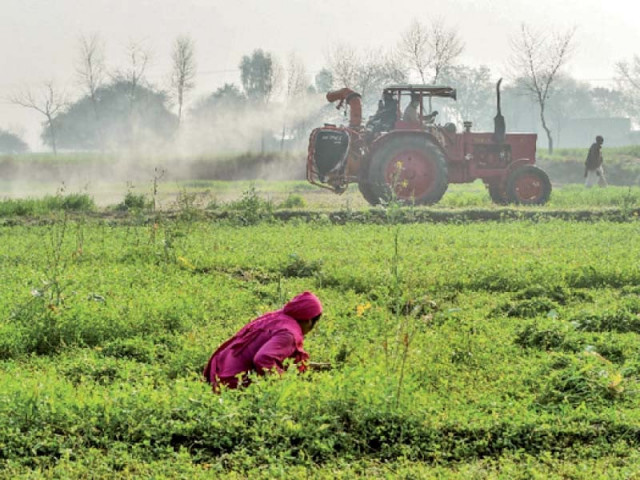Can corporate farming lead us to prosperity?
Could revitalise agri-sector if hurdles, de-incentivising weaknesses are addressed

Transforming from conventional farming to corporate farming might bring about prosperity, provided that rules are formed and implemented strictly to benefit local communities and local farmers. Corporate farming could revitalise the agriculture sector if the hurdles and de-incentivising weaknesses in the sector are addressed. The country does not have a culture of corporate farming, and this is a new initiative being introduced. Huge areas of cultivable land are being acquired for the project.
Corporate farming, with its advanced systems and efficient practices, is much needed for Pakistan to ensure increased agricultural productivity and food security. While using such automated systems will be an uphill task due to infrastructural and affordability challenges, it can lead to higher incomes for farmers.
The Special Investment Facilitation Council (SIFC) creates a win-win paradigm for Pakistan and its investors through a one-window operation. Pakistan is about to transform its agriculture landscape by transitioning from traditional micro farming culture to cutting-edge, high-yield, and low-cost community-based modernised corporate farming.
Pakistan’s global rankings consist of being the 15th largest producer in the agriculture sector, the seventh largest producer of wheat, the fifth largest producer of cotton, the sixth largest producer of mango, the fifth largest producer of sugarcane, the 20th largest producer of livestock, the 11th largest market of poultry, with fishery exports increasing by 19% in FY2023, and meat exports increasing by 29% in FY2023.
Zeeshan Baig, General Manager of Syngenta Pakistan, said, “Corporate farming can bring prosperity in the form of modern technologies, better practices, enhanced efficiency, and foreign investments in agriculture. Overexploitation of arable lands poses a challenge in all models and can be discouraged by adopting regenerative agricultural practices and land preservation – corporate farming is probably our safest option to do so.” He underscored the importance of understanding the main targets of the agriculture sector: food security, farmers’ profitability, increased exports and raw materials, and mitigation of climate change. Conventional farming falls short in achieving any of these due to inherent inefficiencies. On the other hand, corporate farming offers better utilisation of available resources for maximum gains.
“Absolutely, corporate farming has a lot of potential to attract Foreign Direct Investments (FDI) to Pakistan as some high-value markets such as the Middle East and European Union need other countries to ensure their food requirements. That being said, careful regulations are needed to enhance food security, stabilise prices, ensure fair distribution of benefits to rural communities, and prevent monopolies,” he said.
Senior Analyst, Author, and former ambassador M Alam Brohi weighed up pros and cons while presenting suggestions. Instead of huge corporate farming, if Sindh’s land of 52,000 acres (which is being acquired) is distributed with 10 acres to each landless peasant, over 5,000 families would be lifted out of poverty. By this scale, one can see how many landless farming families could become prosperous.
Expressing some reservations about this new technique, he said that the land in Sindh must be in the command area of a canal.
However, the land in Cholistan and other desert areas would need a new irrigation system – canals and water courses – and would take water from the Indus Water System upstream, which further reduces the flow of water to Sindh, already facing scarcity of water in both seasons – Kharif and Rabi.
“The corporate will be fully operationalised if everything goes according to the managers’ plan within the coming three-to-four years. Inflation will further increase owing to the tough conditionalities of the International Monetary Fund (IMF). The value of the Pakistani currency is reduced to pebbles. Poverty has increased. The question is whether these corporate farming projects are public welfare oriented or geared towards another purpose. Would these farms provide their produce at subsidised rates? I don’t think these farmings would be feasible if they market their produce at subsidised cost.
The cost for the construction of new irrigation infrastructure in Cholistan alone is estimated at Rs350 billion. With this amount, we can improve the efficiency of our existing irrigation infrastructural network and ensure food security,” he said.
Meanwhile, when it comes to cooperative farming, it can be beneficial for all stakeholders since efficient pooling of available resources can be ensured. Utilising the public sector’s available agricultural lands for cooperative purposes will actually boost the scale and efficiency of this model, but concerns over land distribution and equitable benefits must be addressed for sustainable agricultural development.


















COMMENTS
Comments are moderated and generally will be posted if they are on-topic and not abusive.
For more information, please see our Comments FAQ